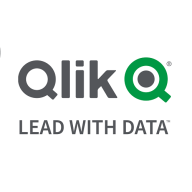

Oracle Data Integrator and Qlik Replicate compete in the data integration and management sector. Qlik Replicate holds an advantage with its focus on real-time change data capture and minimal impact on source databases.
Features: Oracle Data Integrator offers advanced capabilities for complex data integration workflows, re-usable mappings, and design-time automation through its Knowledge Module approach. It is effective for both experienced developers and newcomers. ODI supports extensive ELT capabilities and handles diverse data sources efficiently. Qlik Replicate focuses on real-time change data capture and efficient data replication and transformation with minimal source database impact. It excels in managing data tasks with simple configurations and effective use of logs.
Room for Improvement: Oracle Data Integrator could enhance user interface performance and error handling and reduce initial setup complexity. There is a noted steep learning curve, with users desiring better versioning and broader technology integration. Qlik Replicate should refine its error messages, improve integration across multiple destinations, and enhance its user interface. Users have also expressed a need for improved scheduling capabilities and more intuitive configurations.
Ease of Deployment and Customer Service: Oracle Data Integrator is primarily deployed on-premises, providing stability but facing inconsistent customer support, especially with issues involving multiple Oracle technologies. Support quality varies with some prolonged resolution times. Qlik Replicate offers versatile deployment across on-premises, public, and hybrid cloud environments. Customer service details are less reported, indicating fewer issues or interactions.
Pricing and ROI: Oracle Data Integrator is seen as expensive in complex environments, though it offers a significant ROI when implemented correctly, thanks to its comprehensive functionality. Its pricing is complicated, requiring careful licensing consideration to optimize costs. Qlik Replicate is perceived as less expensive than alternatives like GoldenGate, offering flexible licensing options. Still, it is seen as costly for smaller businesses. Both products provide strong ROI when effectively used by automating data management tasks and saving time.
I conducted a cost comparison with the AWS service provider, and this option is much cheaper than the Kinesis service offered by AWS.
I can get solutions quickly, and any tickets I submit to Oracle are responded to and resolved rapidly.
Even priority tickets, which should be resolved in minutes, can take days.
If I use a source system like Oracle and a target system like Teradata, ODI will still run, but it struggles a bit with different infrastructures.
It is a core-based licensing, which, especially in the banking industry, results in the system capacity being utilized up to a maximum of 60%.
ODI is cheaper compared to Informatica PowerCenter and IBM DataStage.
Licensing is calculated based on the machine's total capacity rather than actual usage.
Oracle Data Integrator (ODI) is powerful and strong if my system uses Oracle components for environments like OLTP, enterprise data warehouse, or data marts.
Data retrieved from the system can be pushed to multiple places, supporting various divisions such as marketing, loans, and others.


Oracle Data Integrator (ODI) is a data integration software solution that provides a unified infrastructure to streamline data and application integration projects. It uses a powerful design approach to data integration, which separates the declarative rules from the implementation details. The solution is based on a unique ELT (Extract Load Transform) architecture, eliminating the need for a standalone ETL server and proprietary engine.
Oracle Data Integrator Features
ODI has many valuable key features. Some of the most useful ones include:
Oracle Data Integrator Benefits
There are many benefits to implementing ODI. Some of the biggest advantages the solution offers include:
Reviews from Real Users
Below are some reviews and helpful feedback written by PeerSpot users currently using the Oracle Data Integrator (ODI) solution.
Brian D., Business Process and Strategy Specialist Advisor at NTTData, says, “The Knowledge Module (KM) is my favorite feature of ODI. This is where I learned how to use variables to make jobs dynamic. I took that knowledge and created a KM that would go into iTunes and pull the sales of eBooks. Making something that is reusable, like a KM, is important to not only reduce build time but also maintenance in the future.”
Ashok S., Applications Support Manager at a marketing services firm, mentions, "The most valuable features of ODI are the ease of development, you can have a template, and you can onboard transfer very quickly. There's a lot of knowledge modules available that we can use. If you want to connect, for example, a Sibyl, SQL, Oracle, or different products, we don't have to develop them from scratch. They are available, but if it's not, we can go into the marketplace and see if there's a connector there. Having the connector available reduces the amount of hard work needed. We only have to put the inputs and outputs. In some of the products, we use there is already integration available for ODI, which is helpful."
Qlik Replicate is a data replication solution for replicating data from one source database to another for business intelligence software. It offers data manipulation and transformations, replication without impacting source databases, and ease of use without needing ETL. The solution is stable and user-friendly, with detailed logging and support.
Qlik Replicate has improved the organization by allowing each team to replicate their data into a single-source data location. The most important feature of Qlik Replicate is its ability to replicate and update records without needing a programmer.
We monitor all Data Integration reviews to prevent fraudulent reviews and keep review quality high. We do not post reviews by company employees or direct competitors. We validate each review for authenticity via cross-reference with LinkedIn, and personal follow-up with the reviewer when necessary.